Curious about rituals? Rituals are actions filled with meaning, observed across cultures to connect people with their traditions and beliefs. This article will delve into what rituals are, their origins, and their various modern applications, including how these rituals can enhance our daily lives. Indeed, understanding the significance of each ritual can deepen our appreciation for cultural practices.
Key Takeaways
- Rituals are meaningful practices that connect us to our cultural heritage and help us navigate life’s significant moments.
- They come in various forms, such as rites of passage and healing rituals, reflecting cultural diversity while uniting communities.
- In modern contexts, rituals can enhance personal empowerment, community bonding, and should incorporate ethical considerations to honor their significance.
Understanding Rituals
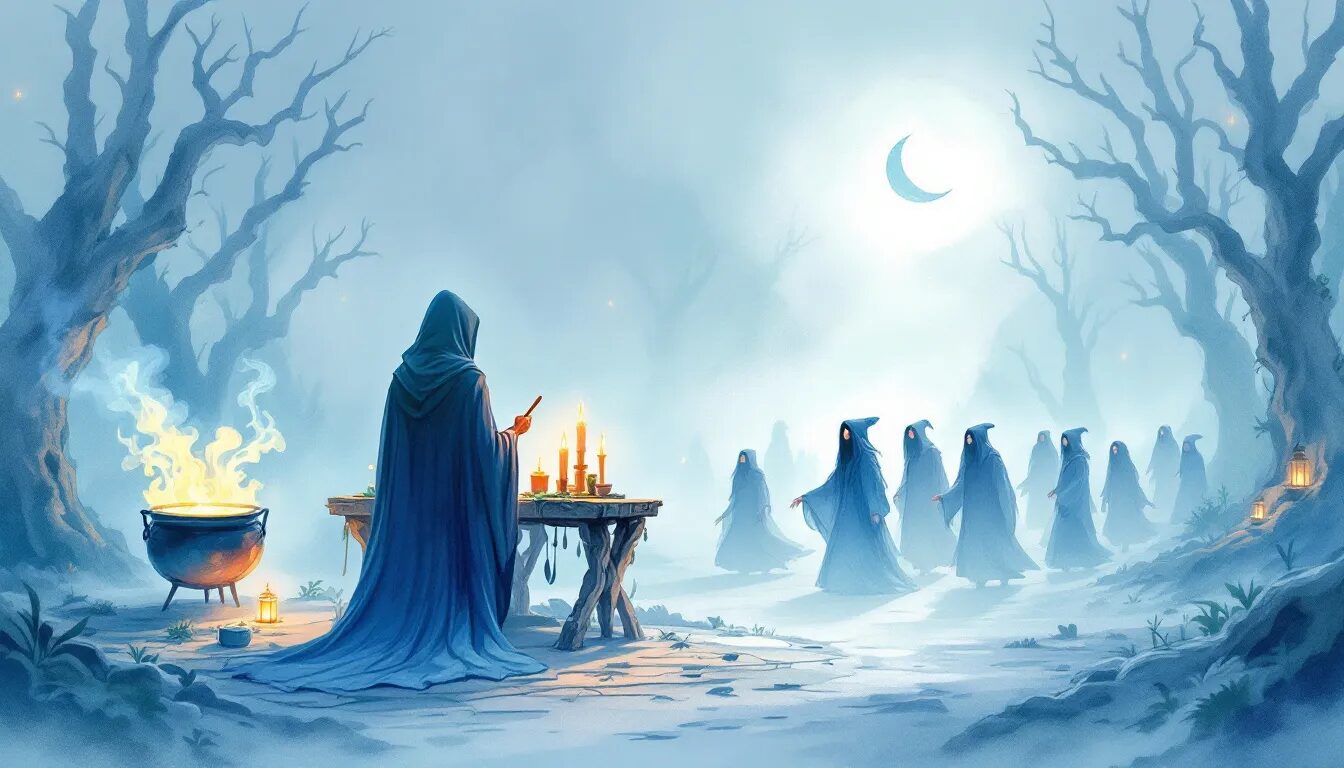

Rituals are structured, symbolic practices that hold significant cultural and personal meaning in societies. They are the sacred choreography of life, a dance that brings meaning to our actions and connects us to our heritage and beliefs. The importance of rituals cannot be overstated; they are the threads that weave the fabric of our collective identity.
Rituals vary widely across cultures, reflecting the diverse beliefs and practices that define different communities. From the elaborate ceremonies of secret societies to the everyday rituals practiced by modern witches, each ritual carries its unique significance and purpose. These practices are not just about the actions themselves but about what they represent and the emotions they evoke.
Understanding rituals offers a window into how society organizes itself and expresses its collective identities. Examining a culture’s rituals reveals their core values, fears, hopes, and dreams. It is through rituals that the abstract becomes tangible, and the mystical becomes a part of our daily lives.
The basic beliefs behind rituals are deeply rooted in the human experience. They are a way to mark significant moments, to honor the past, and to create a sense of continuity in an ever-changing world. Whether through the solemnity of a wiccan ceremony or the joyous celebration of a cultural festival, rituals help us make sense of our existence and connect with the divine.
Origins of Rituals
The origins of rituals are as ancient as humanity itself. Scholars have long debated where and how these practices began, but one common thread is the division between the sacred and the profane. Émile Durkheim proposed that rituals originated from totemism, where early societies divided their experiences into sacred and profane realms.
The concept of sacrifice, whether human or animal, was central to early theories of ritual origins. This practice was believed to be a way for communities to commune with the divine and seek favor from their deities. W. Robertson Smith suggested that rituals stemmed from communal desires for connection with the divine, often linked to totemic practices.
Rituals are seen as a universal behavior, integral to human identity across all societies. Historians view ritual behavior as an expression of the sacred, emphasizing its significance beyond mere history analysis. Rituals are not just historical artifacts; they are living, breathing practices that continue to shape our lives and communities.
The relationship between ritual and language is also crucial. Just as words can convey deep meaning, rituals serve as symbolic acts that communicate complex ideas and emotions. They are a form of non-verbal communication that transcends time and culture, connecting us to our ancestors and to each other, which means we can better understand our shared experiences.
Types of Rituals
Rituals come in many forms, each serving a unique purpose and reflecting the diverse practices of different cultures and other forms of rituals. One of the most common types of rituals is the rite of passage, which marks significant life transitions such as birth, adulthood, marriage, and death. These young rituals often involve a series of stages that validate new social roles and provide emotional support.
Healing rituals are another important category, performed with the intention to heal and restore health and balance. These rituals can utilize various techniques like chanting, herbs, or community support to achieve their goals. Whether through the soothing words of a prayer or the healing touch of a ritual bath, these practices aim to bring comfort and wellness.
Calendrical rituals are tied to the calendar and seasons, celebrating events like solstices, equinoxes, or agricultural cycles. These rituals reflect the deep connection between human life and the natural world, honoring the cycles of nature and what is happening around us. They remind us of our place in the universe and our dependence on the earth’s rhythms.
Different cultures may have unique variations of similar types of rituals, adapting practices to fit local beliefs and traditions. Many cultures enrich our understanding of the human experience and highlight the universal need for rituals to mark the passage of time and the milestones of life.
Rituals in Modern Witchcraft
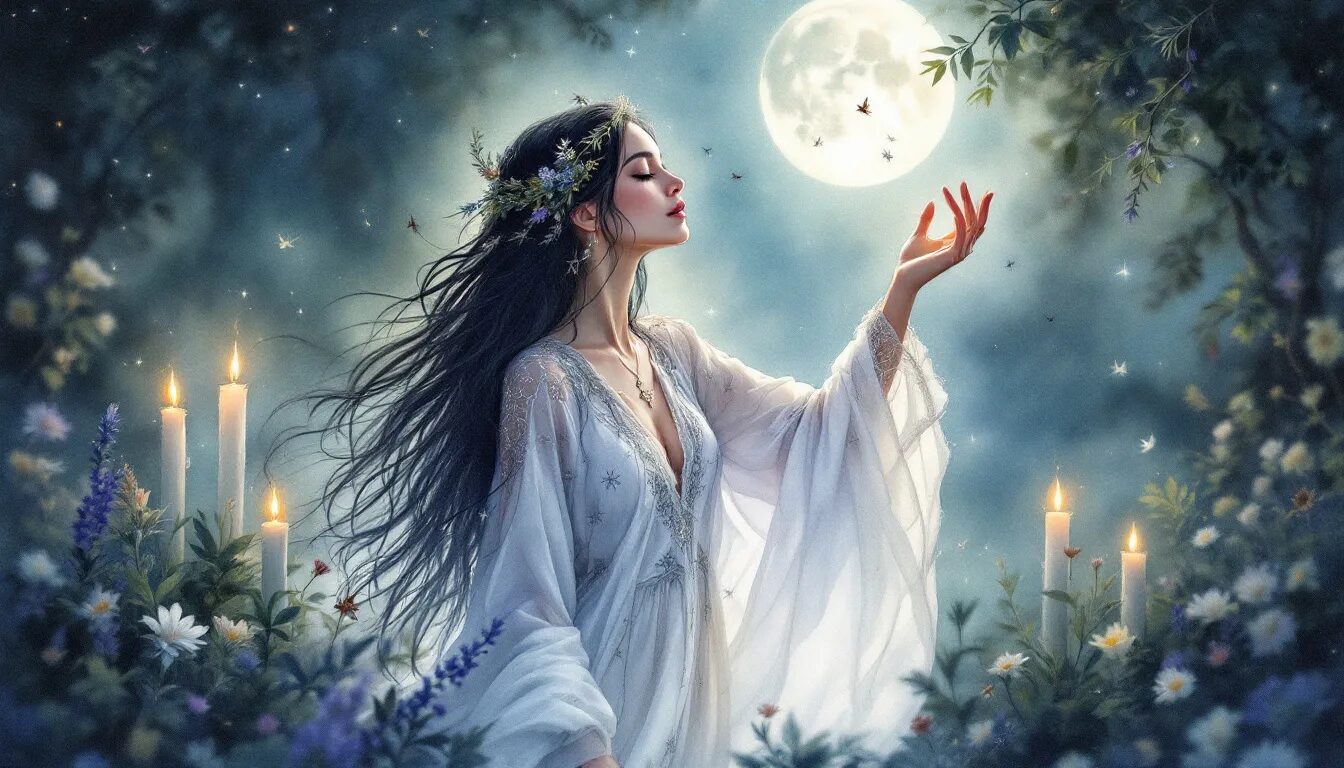

Modern witchcraft today is a vibrant and diverse practice, with rituals playing a crucial role in its various paths since witchcraft began. Practitioners, including wiccans, identify with traditions such as:
- Wicca
- Paganism
- Folk magic
- New Age beliefs
Each path has its unique rituals, but all share a common goal: to connect with the divine deity goddess and harness the power of magic through worship.
Eclectic witches intuitively select practices that feel true to them, while traditional witches often adhere to specific historical practices. This flexibility allows modern witches to create rituals that resonate with their personal beliefs and needs. For instance, kitchen witchery emphasizes practical applications and intentional magic within everyday life, using ordinary tasks to create magical experiences.
Kitchen witches often use seasonal ingredients in their practices, connecting with nature’s cycles through cooking and other daily activities. Rituals in kitchen witchery may include using affirmations, sigils, or runes while preparing food, combined with simple practices like lighting a candle or saying a blessing. These small acts of magic infuse daily life with a sense of wonder and purpose.
The diversity of paths and practices in modern witchcraft reflects the individual expression of spirituality among practitioners. Whether you are a green witch, a kitchen witch, or identify with another path, the rituals you create can be a powerful way to connect with your inner self and the world around you.
The Role of Nature in Rituals
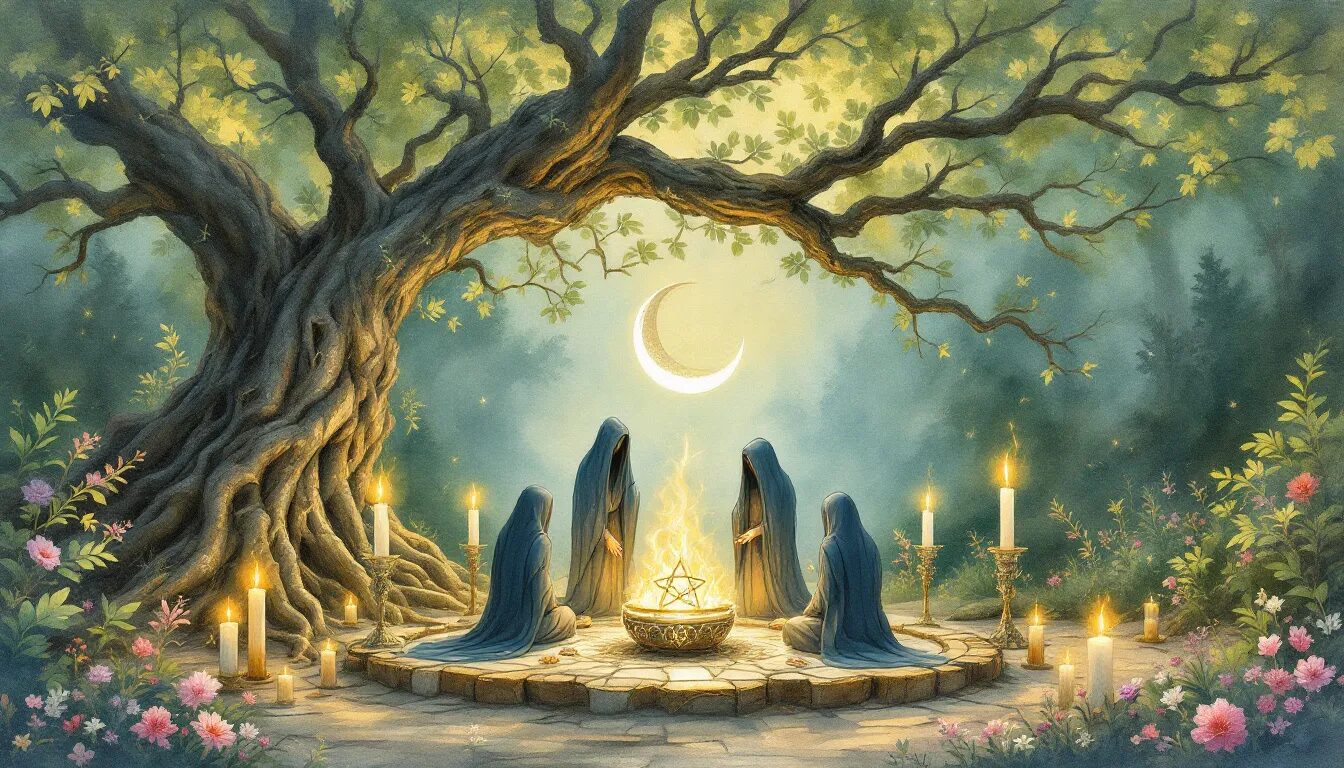

Nature plays a central role in many rituals, especially in practices like green witchcraft. Green witches create ritual tools from natural objects and consider the energies within them. This deep connection with the natural world is a cornerstone of their practice, emphasizing respect and gratitude for the earth’s resources.
Green witches often express gratitude to plants and animals by leaving offerings after harvesting. They believe in asking permission from nature before engaging with its resources, fostering a relationship based on mutual respect and harmony. This practice highlights the importance of ethical considerations in rituals, ensuring that nature is honored and preserved.
The cycles of nature are viewed as sacred, highlighting themes of life, death, and rebirth. Green witchcraft emphasizes a deep connection and respect for the natural world, integrating its elements into rituals. Whether through the use of seasonal ingredients, natural tools, or outdoor ceremonies, these rituals celebrate the beauty and power of the earth.
By incorporating nature into rituals, practitioners can create a profound sense of close connection and balance. The natural world created offers endless inspiration and resources for rituals, reminding us of our place in the larger web of life and our connection to god.
Rituals Across Religions
Rituals are a common thread that weaves through many religions, each with its unique practices and beliefs. In Buddhism, there are no universally mandated funeral rites, and practices often reflect local customs. This flexibility allows for a wide range of rituals that honor the dead and provide comfort to the living.
Christianity, on the other hand, has sacraments that are considered vital rituals signifying important spiritual milestones. These sacraments, such as baptism and communion, are central to the faith and serve to strengthen the believer’s connection with the divine. Purification rituals are also common across many religions, cleansing individuals before sacred activities. The role of religion in these practices cannot be understated.
Ceremonial acts like blessings are widespread, serving to invoke divine favor and protection. These rituals often bring communities together, reinforcing shared beliefs and values. Whether through prayer, sacrifice, or rites of passage, religious rituals play a crucial role in the spiritual lives of individuals and communities.
The diversity of rituals across religions reflects the rich tapestry of human spirituality. Each tradition offers unique ways to connect with the divine, honor the sacred, and strengthen community bonds. By understanding these rituals, we can appreciate the depth and beauty of different spiritual paths.
Rituals for Personal Power
Rituals can be a powerful tool for personal empowerment, offering a way to align intentions with desires and cultivate a focused path toward achieving goals. The psychological effects of rituals can evoke strong emotions, providing comfort and a sense of connection during times of change.
Performing rituals can also cultivate a state of mindfulness, allowing individuals to become more attuned to their surroundings and inner selves. This heightened awareness can lead to greater clarity and a deeper understanding of one’s goals and desires. Engaging in rituals can help individuals align their intentions with their desires, creating a focused path toward achieving personal goals.
Certain practices, such as meditation and visualization, are commonly integrated into rituals to enhance mental clarity and strengthen personal resolve. These techniques can help individuals visualize their goals and take concrete steps toward achieving them, instilling a sense of hope.
Rituals often serve as a bridge to connect with spiritual entities or deities, providing a sense of guidance and support in personal endeavors. By incorporating rituals into daily life, individuals can harness their power to create meaningful change and achieve their deepest desires. Whether through simple acts of mindfulness or elaborate ceremonies, rituals offer a way to connect with inner strength and pursue personal growth.
Rituals for Community Bonding
Rituals play a vital role in creating a sense of community and shared purpose. When practiced in groups, rituals can amplify the overall energy and intention behind the actions, creating a powerful sense of connection and unity. These practices can create social cohesion by fostering shared experiences and reinforcing group identities.
Rituals help transmit cultural values and knowledge across generations, shaping individual and community identities. Celebrating significant milestones through rituals strengthens community ties and reinforces feelings of shared success. Whether through communal celebrations, rites of passage, or seasonal festivals, rituals bring people together and create a sense of belonging.
Community rituals can define a group’s identity by reinforcing shared values and behaviors among its members. These practices can also serve as onboarding tools for new members, helping them integrate into the community culture and understand its values. Well-planned rituals encourage participation and trust among community members, contributing to a cohesive and vibrant environment.
Regularly scheduled rituals provide stability within a community, helping members know what to expect and creating a routine. By fostering deeper connections and enhancing communication, rituals play a crucial role in building strong, supportive communities.
Common Ritual Tools and Symbols
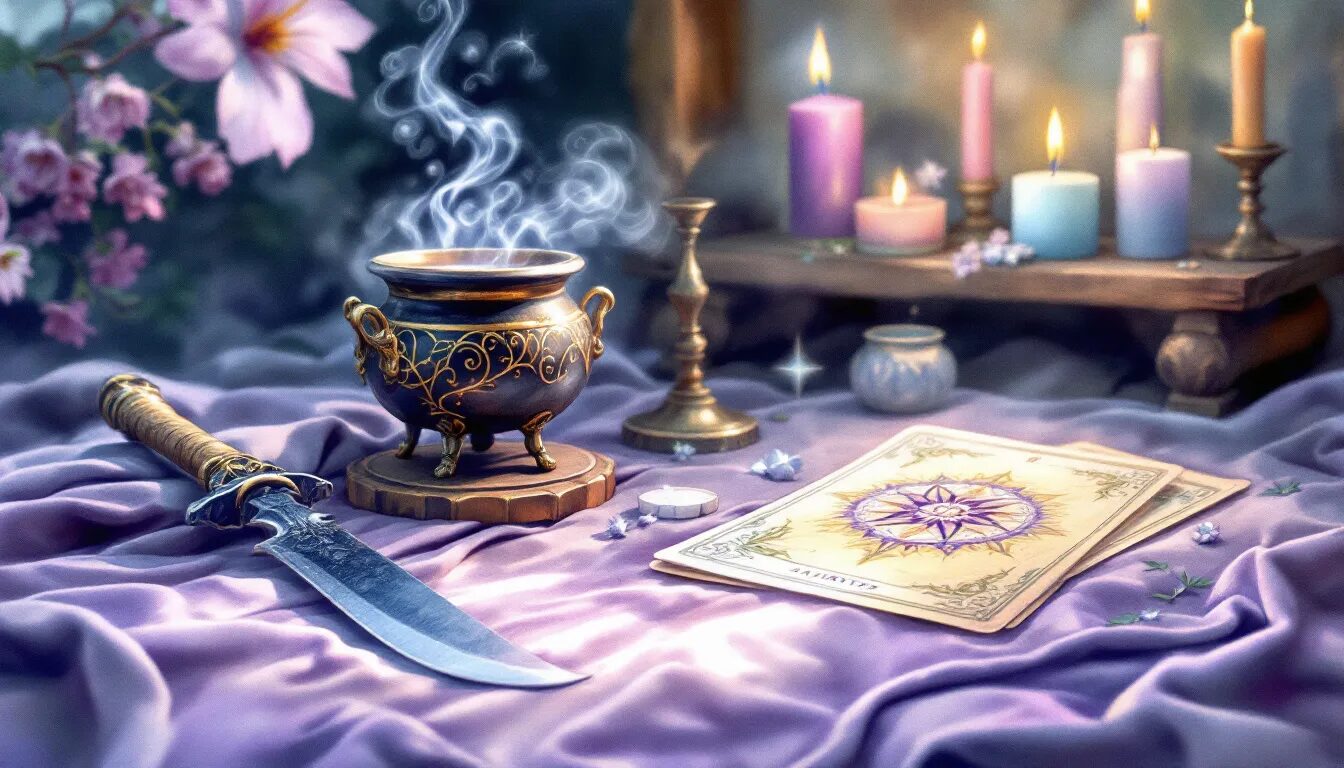

In the practice of witchcraft, common tools and symbols play a crucial role in enhancing the effectiveness and meaning of rituals. A chalice, for instance, is commonly employed to hold sacred liquids, symbolizing the element of Water and serving as a vessel for offerings. The pentacle, a five-point star within a circle, is used in rituals as a symbol of protection and the interconnectedness of the elements, highlighting its significance at this point.
Wands are used to channel energy during rituals, often representing the element of Air and the practitioner’s intention. Common elements in spell casting can include tools like candles and herbs, which are often believed to enhance the spell’s effectiveness. These tools serve as focal points for the practitioner’s energy and intent, amplifying the power of the ritual.
Incorporating symbols or elements that hold personal significance can enhance the emotional impact of rituals, making them more effective in manifesting desires. Whether through the use of traditional tools or personal items, rituals often utilize common tools and symbols to enhance their effectiveness and meaning. By understanding and using these tools, practitioners can create more powerful and meaningful rituals.
Rituals and Spell Casting
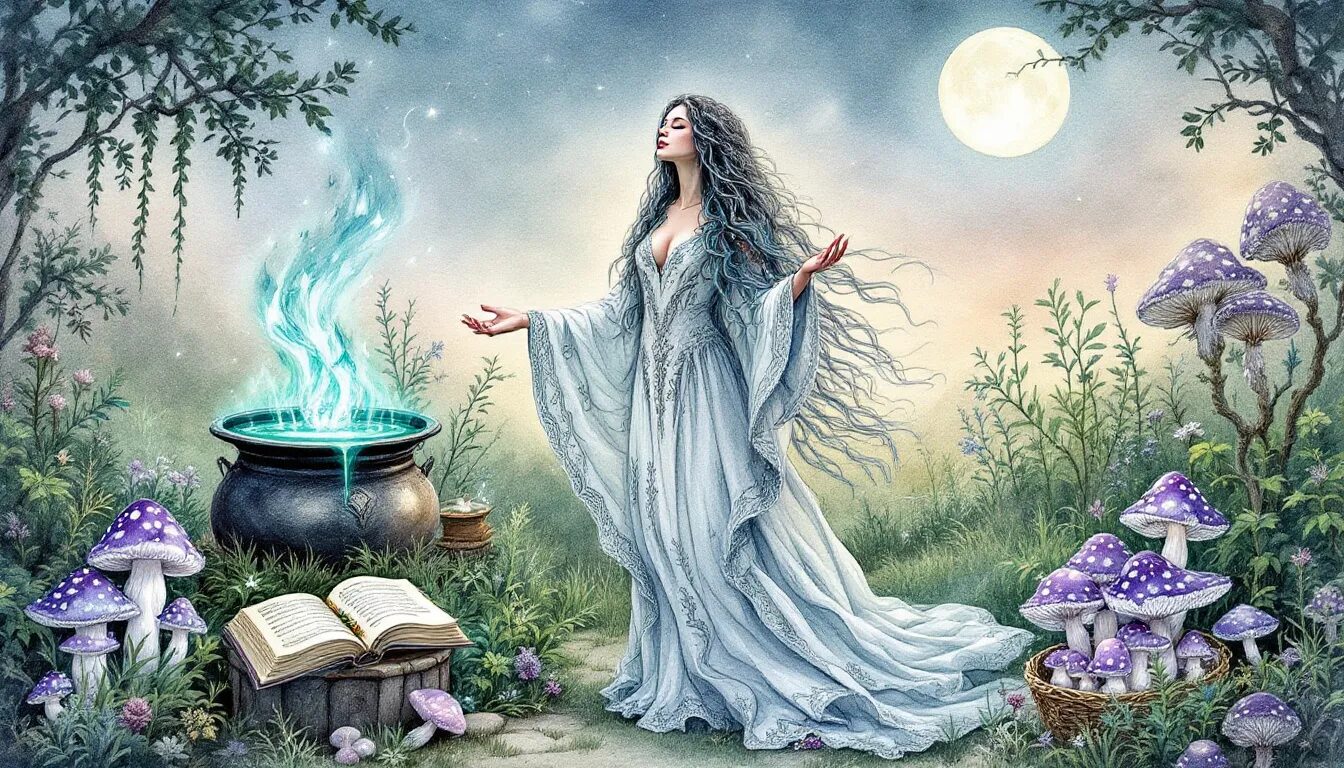

Rituals and spell casting are deeply intertwined, with each enhancing the power and effectiveness of the other. Rituals are distinct from routines, as they carry deeper symbolic meanings and adhere to specific cultural protocols. Candles are often used in rituals to focus energy and symbolize illumination, representing the connection between the physical and spiritual realms.
Herbs are valued in rituals for their unique properties and associations, often used for purification, protection, and attracting specific energies. Ritual tools like the athame (ritual knife) are used to direct energy and set boundaries within ceremonial spaces, often associated with the element of Fire. Incense is burned during rituals to purify the space and invite spiritual spirits, with different scents corresponding to various intentions.
Rituals serve to enhance the focus and intent of participants, allowing collective energy to amplify the power of spells. The success of a spell can be influenced by the caster’s confidence and belief in the process, where self-doubt can weaken its impact. Spells often require precise wording and intent to ensure their effectiveness, emphasizing the importance of clarity in the caster’s desires.
By understanding the relationship between rituals and spell casting, practitioners can harness the full power of their magical practices. Whether through the use of traditional tools or personal items, rituals and spells work together to create a powerful and meaningful experience, enhancing their spell work.
Ethical Considerations in Rituals
When engaging in rituals, especially those involving spell casting, ethical considerations are paramount. Respecting different moral traditions helps prevent the exploitation of vulnerable populations in ritual practices. Ignoring cultural contexts in rituals can lead to harm and a disconnect between ritual practices and participants’ values. For example, using sacred symbols or practices without understanding their significance can be seen as cultural appropriation and disrespectful.
Ethical frameworks should adapt to reflect the complexities of diverse cultural perspectives surrounding rituals and their various aspects, including how each person may interpret them. Ethical imperialism, where universal moral standards disregard local beliefs and practices, should be avoided.
Many traditions emphasize the necessity of protective measures prior to casting spells to guard against unintended consequences and bad luck. Practitioners must ensure that their actions align with their values, respect others, and consider the wider impact of their rituals to alleviate any fear.
Summary
Rituals are a powerful and transformative practice that can bring meaning, connection, and empowerment to our lives. From their ancient origins to their modern adaptations, rituals reflect the diverse beliefs and practices that define different cultures. Understanding the origins and types of rituals helps us appreciate their significance and the ways they shape our collective and individual identities.
In modern witchcraft, rituals are a vital component, providing a structure for spell casting and connecting practitioners with the natural world. The role of nature in rituals, especially in green witchcraft, highlights the importance of respecting and honoring the earth’s resources. Rituals also play a crucial role in various religions, offering a way to connect with the divine, strengthen community bonds, and mark significant life transitions.
Rituals for personal power enable individuals to align their intentions with their desires, fostering mindfulness and clarity. Community rituals create a sense of belonging and shared purpose, enhancing social cohesion and transmitting cultural values. Common ritual tools and symbols, such as chalices, pentacles, and wands, amplify the power and meaning of rituals, making them more effective in manifesting desires.
Ethical considerations are essential in practicing rituals to ensure respect for cultural contexts and prevent harm. By understanding and embracing the power of rituals, we can create a more meaningful and connected life. Whether you are a seasoned practitioner or a curious novice, rituals offer a path to deeper spiritual and personal fulfillment.
Frequently Asked Questions
What is the difference between a ritual and a routine?
Rituals are meaningful actions tied to culture and symbolism, while routines are just everyday tasks without that deeper significance. So, think of rituals as special moments and routines as the regular habits that keep your day moving.
How do rituals enhance the effectiveness of spell casting?
Rituals boost the effectiveness of spell casting by sharpening focus and intent, allowing collective energy to strengthen the spells. Using tools like candles and herbs adds to this power, making your magic even more impactful.
Why is it important to consider ethical considerations in rituals?
It’s crucial to consider ethical considerations in rituals to respect cultural contexts and avoid exploitation. By doing so, you ensure that the practices align with your values and prevent any potential harm or cultural appropriation.
How do rituals for personal power work?
Rituals for personal power work by aligning your intentions with your desires, boosting mindfulness and clarity. Incorporating practices like meditation and visualization can enhance your focus and determination.
What are some common tools used in rituals?
Rituals often incorporate tools like chalices for sacred liquids, pentacles for protection, wands for channeling energy, and candles and herbs to boost the spell’s power. These items help create a meaningful atmosphere and enhance your intentions.
Follow Exorcista for more stories and rituals!











